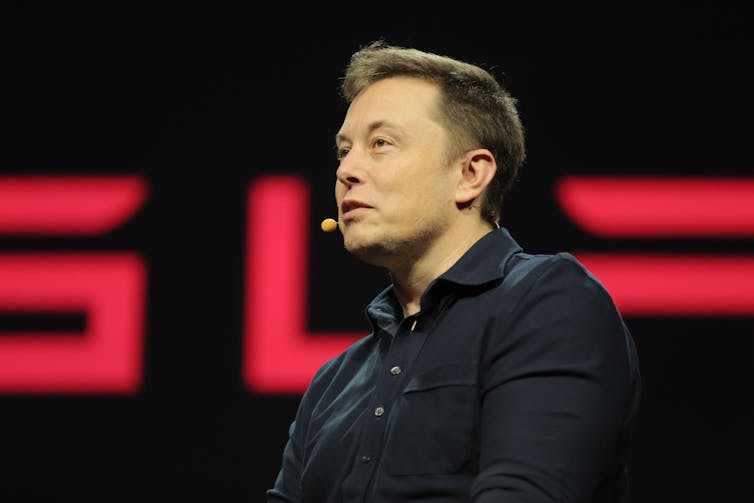
Elon Musk has spoken to Saudi Arabia’s sovereign wealth fund about taking Tesla private NVIDIA / flickr, CC BY-NC-ND
Elon Musk jolted markets and shareholders when he tweeted his intention to take his electric car company, Tesla, private. Saudi billions, he proposed, could help the company escape the pressures of being publicly listed. In a blog post, Musk said ‘the Saudi Arabian sovereign wealth fund [had] approached [him] multiple times about taking Tesla private’.
Oil wealth meets futuristic electric cars may sound like an odd mix. But there is growing precedent for this kind of investment from sovereign wealth funds (SWFs), which are motivated by social as well as financial aims. So much so that they are disrupting how capital markets work.
The result could be calamitous. A look at the history of large inflows into specific asset classes does not bode well for the venture capital (VC) industry. When petrodollars were funneled into the eurodollar market in the 1960s, it drove asset spikes and then resets. Similarly, Japanese investment in American real estate fueled a spectacular bubble – and then crash – in the early 1990s. US investment bank lending in Latin American debt in the 1980s ultimately culminated in a ’decade of lost growth’.
A typical refrain is that ‘this time it’s different’. But it’s never different. We argue that the global rise of SWF investments into VC is driving a similar cycle of asset inflation that will end in tears.
Huge sums of money
The reason SWF money could prove destabilizing for VC comes from the nature of the way VC works. Traditionally, nimble investment firms, led by experienced partners with technical and operational expertise, would identify potentially disruptive technologies and then work with the fledgling firms on strategy, hiring and product. This ‘smart money’ is said to have catapulted Silicon Valley technology firms into global powerhouses.
But the small scale and scrappy nature of VC is a relic of the 20th century. Today, VC funds are backed by some of the world’s largest investors, including funds like Saudi Arabia’s Public Investment Fund (PIF) and Singapore’s GIC. SWFs are investing huge sums of money, both as limited partners in VC funds and as venture capitalists themselves.
The entrance of SWFs into the previous cottage industry of VC has fueled unprecedented levels of ‘dry powder’ (money the VCs need to invest). With more money at their disposal than ever before, VC managers are investing more money in each deal, and making more deals. Recent quarters have seen a previously unforeseen number and size of ‘mega deals’ (deals worth more than $1 bn).
This all means that when – as historical precedent shows is likely – the VC bubble bursts, the fallout will be massive. And in the wake of such a bubble burst, there will be scant capital available for the many start-ups that have raised early-stage funding on hefty valuations. Investors, including SWFs, will be burned by the big losses, and so unwilling to invest in risky start-ups, or VC funds, for years.
The increasing exposure of SWFs to VC comes with national development strategies and the revival of industrial policy. State-owned investment funds have started to embrace disruptive technology investment from artificial intelligence to biotech. Countries with big funds, such as China, have made clear their determination to move up in the global value chain in order to keep growing.
In a similar fashion, big oil exporters like Saudi Arabia are keen to diversify their economies away from oil. Saudi Arabia’s Vision 2030 strives to position the oil kingdom as a global technology and financial hub.
Leading the charge is Saudi Arabia’s PIF, which made a $45 bn investment in SoftBank’s mammoth $100 bn VC Vision Fund, launched in 2017, and in June 2016 directly invested $3.5 bn in Uber. More recently, in March 2018, it led a late-stage VC investment of nearly $1 bn in augmented reality start-up Magic Leap. Now it is in talks with Musk about taking Tesla private.
Beware of the burst
With the billions of dollars suddenly flowing in from SWFs, the size of VC funds is ballooning – and so are the checks they are writing. Early-stage, seed-round investments that were typically $500,000 can now be up to $5 mn.
With so much money to invest, there is a sharp drop in the number of deals in which multiple funds participate and less of a need for start-ups to go public. This results in fewer brains being on hand to offer advice. It also means decisions are made more quickly, with less input from multiple sources. This can be both good (decisions can be made more quickly) and bad (there are fewer checks and balances).
When previous floods of capital proved irresponsible, a diversification of investment opportunities – geographically and in terms of asset class – could have helped reduce the systemic risk. But measures can be put in place today to neutralize the roller coaster that SWF investment in VC is propelling, so that the global exuberance for supporting start-ups around the world proves sustainable.
Funds should be modest in their VC investment activity – for example, placing small bets in line with the workings of the VC industry, rather than deploying checks in line with the size of their funds. Their appeal as buy-out partners, as Musk claims, is not simply an easy alternative to the demands of being publicly listed. The long-term health of Silicon Valley and aspiring Silicon Valleys around the world depends on their discretion. ![]()
Robyn Klingler-Vidra is a lecturer in political economy at King's College London and Juergen Braunstein is a postdoctoral fellow Harvard Kennedy School at Harvard University
This article is republished from The Conversation under a Creative Commons license. Read the original article.











